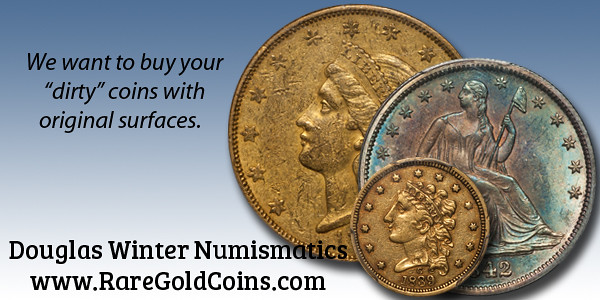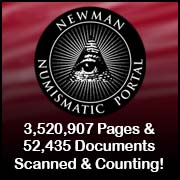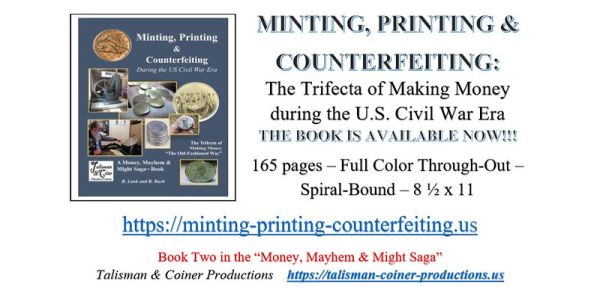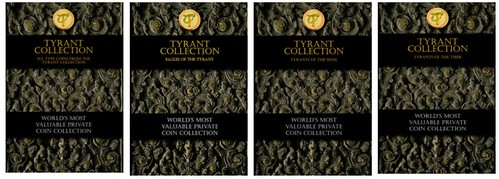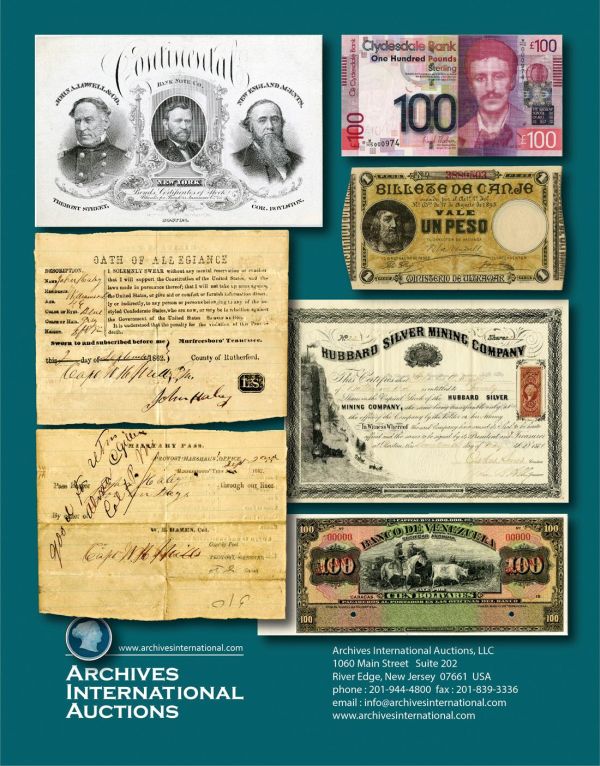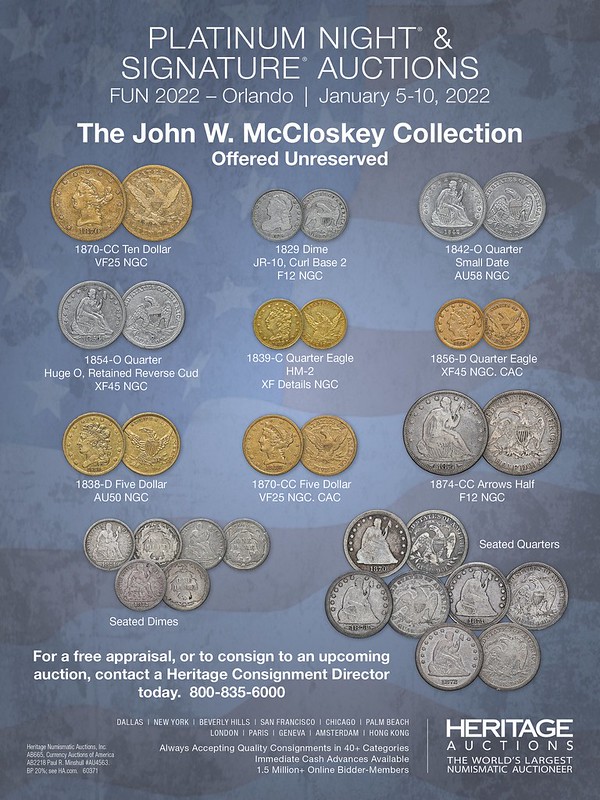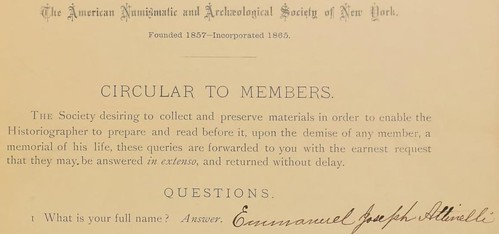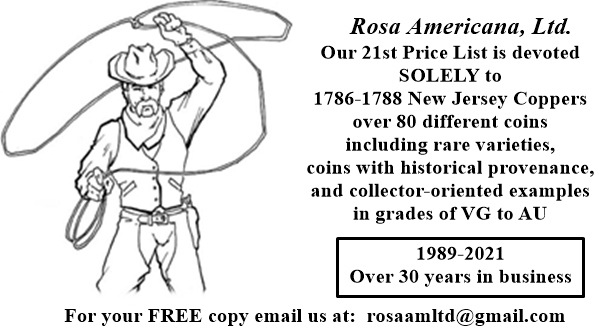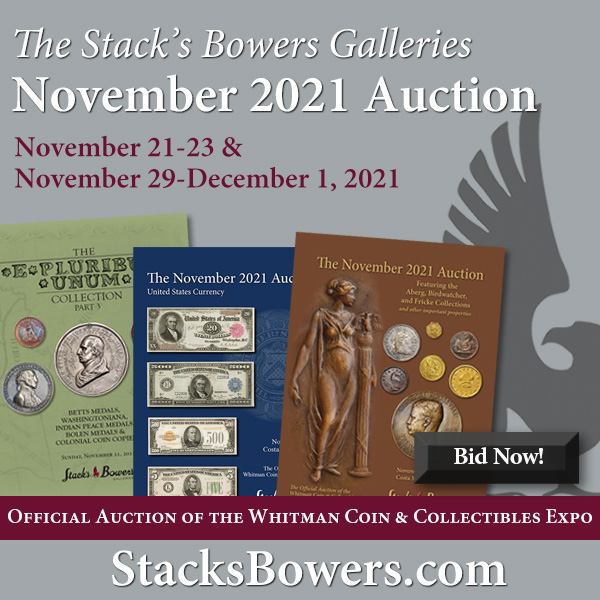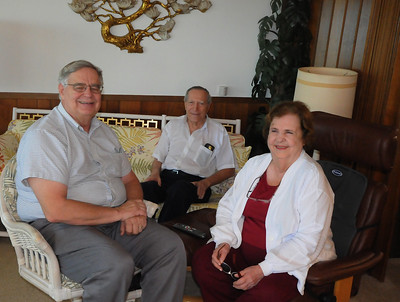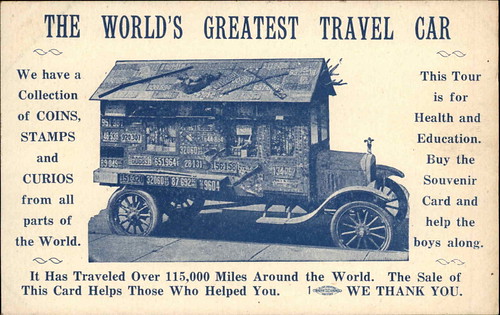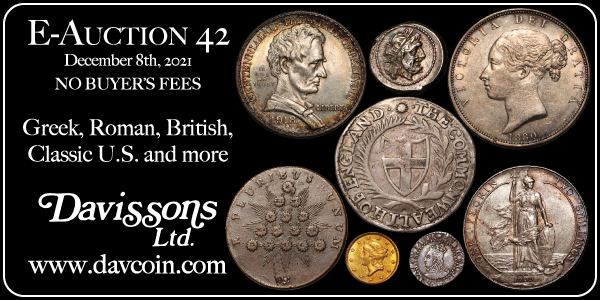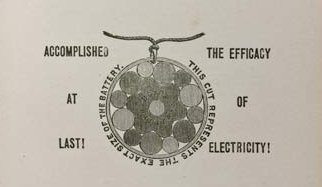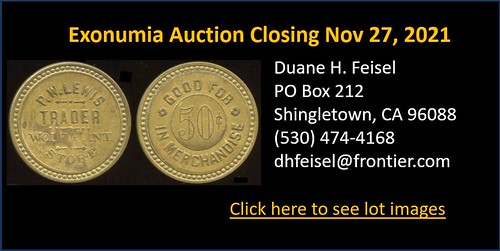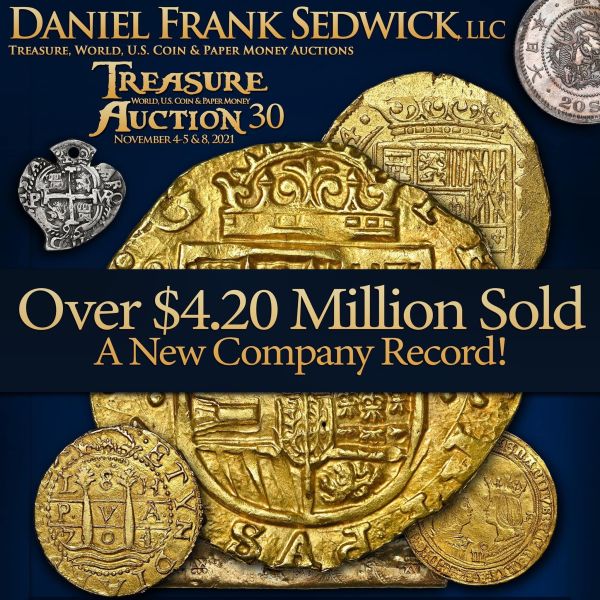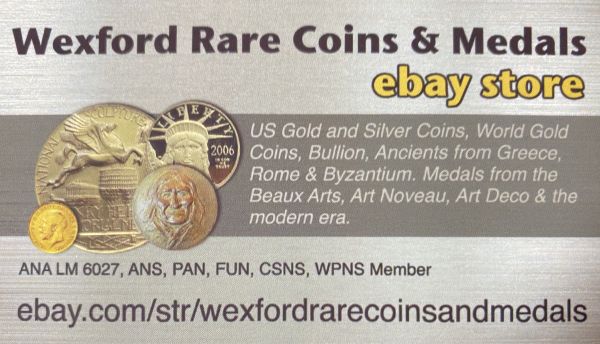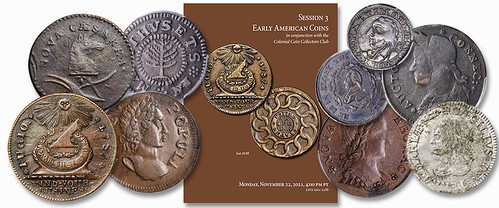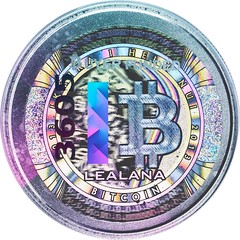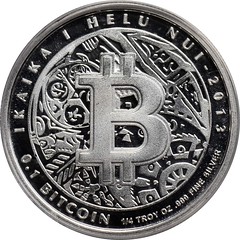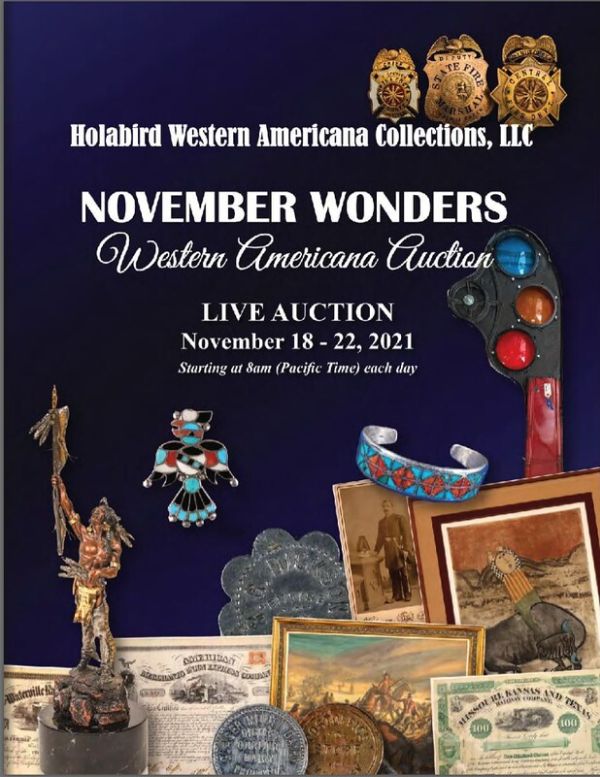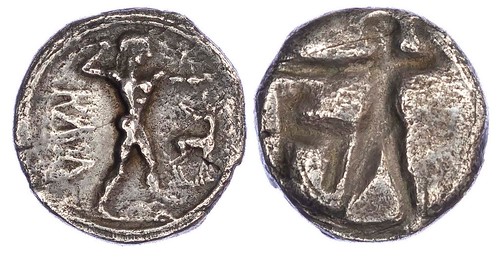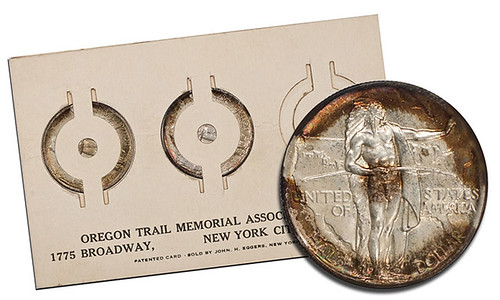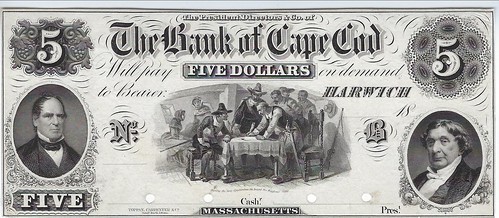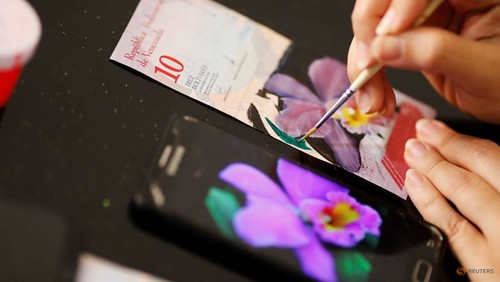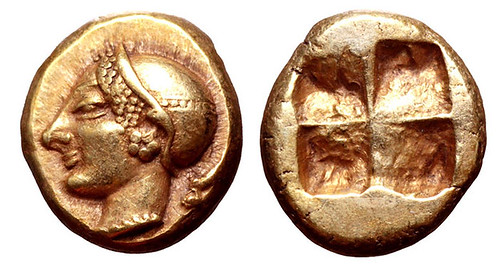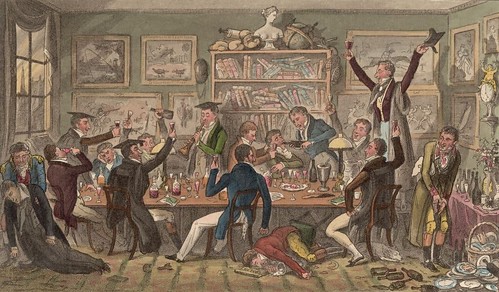
Visit our NBS Sponsors


About UsThe Numismatic Bibliomania Society is a non-profit association devoted to the study and enjoyment of numismatic literature. For more information please see our web site at coinbooks.org SubscriptionsThose wishing to become new E-Sylum subscribers (or wishing to Unsubscribe) can go to the following web page link MembershipThere is a membership application available on the web site Membership Application To join, print the application and return it with your check to the address printed on the application. Print/Digital membership is $40 to addresses in the U.S., and $60 elsewhere. A digital-only membership is available for $25. For those without web access, write to: Charles Heck, Treasurer AsylumFor Asylum mailing address changes and other membership questions, contact Chuck at this email address: treasurer@coinbooks.org SubmissionsTo submit items for publication in The E-Sylum, write to the Editor at this address: whomren@gmail.com BUY THE BOOK BEFORE THE COINSale CalendarWatch here for updates! |
- WAYNE'S WORDS: THE E-SYLUM NOVEMBER 14, 2021
- NEW BOOK: HISTORIA DE LA MONEDA EN PARAGUAY
- NEW BOOK: HISTORICAL MEDAL JOURNAL 2021
- NEW BOOK: GACETA NUMISMáTICA 2021
- BOOK REVIEW: THE TYRANT COLLECTION
- COLLIER PRIZE: ABDY'S ROMAN IMPERIAL COINAGE
- ANS MEMBER CIRCULARS DIGITIZED
- VIDEO: SOUVENIR CARD COLLECTING
- MORE ON THE NAPOLEON MYSTERY MEDALLION
- MORE ON JEAN COHEN'S LINCOLN CENT BOOK
- MORE ON THE TRAVEL CAR COIN MUSEUM
- NOTES FROM E-SYLUM READERS: NOVEMBER 14, 2021
- QUERY: GLOBAL CERTIFICATION SERVICES
- MEDIALIA GALLERY IS MOVING
- VOCABULARY TERM: GALVANISM
- BOYDS BATTERY
- NUMISMATIC SOCIETY OF PHILADELPHIA OFFICERS
- WHITMAN PUBLISHING SEEKS ASSOCIATE EDITOR
- COLONIAL COIN COLLECTORS CLUB 2021 AUCTION
- 2013 SILVER LEALANA 0.1 BITCOIN OFFERED
- DAVISSONS E-AUCTION 42
- NUMISMATIC NUGGETS: NOVEMBER 14, 2021
- CANADA'S OLDEST ENGLISH COIN?
- COMMEMORATIVE COIN TAB TONING
- THANKSGIVING VIGNETTES
- PANDEMIC EFFECTS ON BRICK-AND-MORTAR SELLERS
- VENEZUELAN ARTIST PAINTS OLD BANKNOTES
- GIZMO'S PAINTING ACCEPTS DOGECOIN!
- LOOSE CHANGE: NOVEMBER 14, 2021
- GRANDILOQUENT WORDS OF THE 19TH CENTURY
Click here to read the thin version on the web
Click here to subscribe
Click here to access the complete archive
To comment or submit articles, reply to whomren@gmail.com
Content presented in The E-Sylum is not necessarily researched or independently fact-checked, and views expressed do not necessarily represent those of the Numismatic Bibliomania Society.
WAYNE'S WORDS: THE E-SYLUM NOVEMBER 14, 2021
 New subscribers this week include:
Dr. Pedro Cano, courtesy Roberto Jovel.
Welcome aboard! We now have 6,727 subscribers.
New subscribers this week include:
Dr. Pedro Cano, courtesy Roberto Jovel.
Welcome aboard! We now have 6,727 subscribers.
Thank you for reading The E-Sylum. If you enjoy it, please send me the email addresses of friends you think may enjoy it as well and I'll send them a subscription. Contact me at whomren@gmail.com anytime regarding your subscription, or questions, comments or suggestions about our content.
This week we open with three new books, a review, updates from the ANS and Newman Numismatic Portal, reader comments and more.
Other topics this week include Roman Imperial Coinage, Souvenir Cards, Global Certification Services, Medialia Gallery, Galvanism and Boyd's Battery, the Numismatic and Antiquarian Society of Philadelphia, auction previews, commemorative coin tab toning, the Lealana physical bitcoin, Dogecoin, Thanksgiving vignettes, and grandiloquent words.
To learn more about the numismatics of Paraguay, the Historical Medal Society, the Tyrant Collection, the Napoleon mystery medallion, The Combined Organizations of Numismatic Error Collectors of America, Dealer's Numismatic Association, Whitman Publishing, the Pierre Fricke Collection of Fugio Coppers, the "Comitia Americana" tray, the oldest English coin found in Canada, and the Archaic Smile on ancient coins, read on. Have a great week, everyone!
Wayne Homren
Editor, The E-Sylum
NEW BOOK: HISTORIA DE LA MONEDA EN PARAGUAY
Here's the announcement of a new book on the numismatics of Paraguay by Raúl Olazar. Congratulations! -Editor
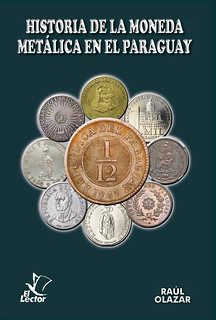 The study of the historical evolution of events, phenomena or objects worldwide
has always been interesting. Getting to know the history and origin of items will
always be of importance for any society. This is how Raúl's new book was born, a
research material entitled HISTORIA DE LA MONEDA METÁLICA EN
PARAGUAY, in collaboration with Editorial El Lector.
The study of the historical evolution of events, phenomena or objects worldwide
has always been interesting. Getting to know the history and origin of items will
always be of importance for any society. This is how Raúl's new book was born, a
research material entitled HISTORIA DE LA MONEDA METÁLICA EN
PARAGUAY, in collaboration with Editorial El Lector.
Currency is part of the heritage of people and has represented over time; the ideal way to exchange goods and services, although this process has not always worked in the same manner. Currency marked a shift in the dynamics of markets and thanks to them several activities in this area were simplified.
Numismatics is a discipline that starts from archeology and that is responsible for studying the coins that are issued in a nation or country. It also refers to the act of collecting coins, even though they are not interdependent activities.
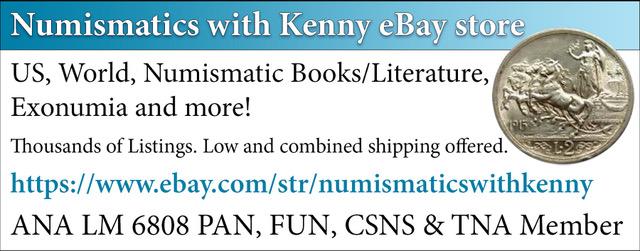
NEW BOOK: HISTORICAL MEDAL JOURNAL 2021
Andrew Wager of the Historical Medal Society passed along this information about the group's new journal and website. Thank you! -Editor
The Historical Medal Society
 After a successful Congress held in July at the M40 J15 Warwick Hotel the Historical Medal Society has just now launched its own website. It can be found at
https://www.historicalmedalsociety.org.uk/
After a successful Congress held in July at the M40 J15 Warwick Hotel the Historical Medal Society has just now launched its own website. It can be found at
https://www.historicalmedalsociety.org.uk/
Collectors of all types of historical medals and medallions should find much to interest them on this site as it develops over the course of the next year. It is intended that more material links and articles of interest will be added in the next few months. The society has also published Volume 3 of its Historical Medal Journal a 64-page magazine containing a host of articles on all types of medal from Roman to the present day.
The HMJ is now gaining an international reputation with subscribers in Europe America and New Zealand as well the UK. Anyone with an interest in this fascinating field of collecting should consider subscribing. For further details see the website or contact the society at historicalmedalsociety@gmail.com
NEW BOOK: GACETA NUMISMáTICA 2021
Adrián González-Salinas of Monterrey, Nuevo León, México submitted this announcement of a new book by the Numismatic Society of Monterrey. Thank you! -Editor
Monterrey's Numismatic Society (Mexico) has published the Gaceta Numismática (Numismatic Gazette) in its web page (https://sonumty.org.mx/) and it's free to be downloaded.
The published articles related to Mexican numismatics are:
THE BOOK BAZARRE
BOOK REVIEW: THE TYRANT COLLECTION
In the November 2021 issue of The Mint Master from the Utah Numismatic Society, Doug Nyholm published a review of the printed catalogs of The Tyrant Collection. With permission, we're republishing it here. -Editor
I recently acquired two booklets published by the owners of the Tyrant Collection, one on US. Type coins which was recently displayed at the recent ANA Convention, and the other on U.S. Gold Eagles minted from 1795 to 1933. Each coin is pictured with a brief description but what is absolutely astounding is the condition of each coin. The vast majority are of the finest known or nearly the finest known with most coins, even 18th and 19th century examples in MS or Proof 67 or 68. The US type set booklet depicts 420 different coins while the US Gold Eagle book has 319 different Eagles displayed.
COLLIER PRIZE: ABDY'S ROMAN IMPERIAL COINAGE
Richard Abdy's 2020 book Roman Imperial Coinage (RIC) vol.II.3 has won the American Numismatic Society's 2021 Collier Prize. Here's the press release. -Editor
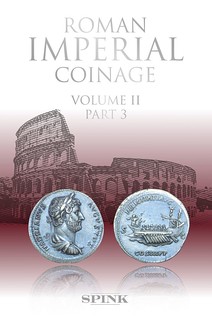 Winner of the ANS's Collier Prize Announced
Winner of the ANS's Collier Prize Announced
In 2020, Carole Anne Menzi Collier established the Collier Prize in Ancient Numismatics at the American Numismatic Society, a new award offered for the first time in 2021. The Prize is named after her late husband Professor James M. Collier and commemorates the life of a remarkable man, an ardent lover of the history and culture of Europe and the Ancient world, and a passionate collector of ancient Greek and Roman coins. A feature on the life of Prof. Collier was published in ANS Magazine 2020, vol. 4.
This substantial monetary prize is to be awarded every third year to the best single or multi-authored book, catalogue, or online digital work in the field of ancient numismatics (650 BCE to 300 CE). The winner(s) receive prize money of $20,000, to be split equally in the event of a multi-authored work. For the initial prize, eligible publications were limited to those works published in 2019 or 2020. A jury of five senior numismatists appointed by the President of the ANS reviewed the nine works submitted this year for the contest and, after a protracted period of study and discussion, selected the winner of the 2021 Collier Prize.
ANS MEMBER CIRCULARS DIGITIZED
The latest addition to the Newman Numismatic Portal is a collection of American Numismatic Society member biography questionnaires. Project Coordinator Len Augsburger provided the following report. -Editor
American Numismatic Society Member Circulars Digitized
Scanning of ANS library and archival materials, sponsored by Newman Portal, continues at a brisk pace. Recently scanned were a set of about a hundred ANS member questionnaires, c. 1890. These circulars include rich biographical information and will be useful to students of ANS and numismatic history.

VIDEO: SOUVENIR CARD COLLECTING
These are selections from the David Lisot Video Library that feature news and personalities from the world of coin collecting. David has been attending coin conventions since 1972 and began videotaping in 1985. The Newman Numismatic Portal now lists all David's videos on their website at:
https://nnp.wustl.edu/library/multimediadetail/522852
Here's one on Souvenir Card Collecting. -Editor
Souvenir Card Collecting Offers Rare Banknote Engravings at Affordable Prices.
VIDEO: 6:49.
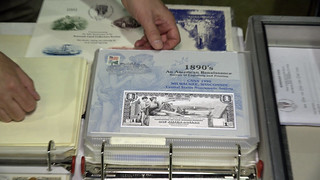 Greg Alexander, Vice-President, Souvenir Card Collectors Society,
www.souvenircards.org.
Greg Alexander, Vice-President, Souvenir Card Collectors Society,
www.souvenircards.org.
David Lisot, Interviewer,
CoinTelevision.com. August 10-14, 2021.
Souvenir cards typically are mementos or souvenirs of a particular occasion, exposition, or hobbyist show. They are not postally valid or intended for use as postcards. Most are printed on high quality card stock using intaglio methods (steel plate engravings). Since 1981, the Souvenir Card Collectors Society has worked to promote this hobby and help collectors understand and catalog the many types of souvenir cards in existence. More than 1,000 varieties of intaglio souvenir cards have been issued since 1960 and hundreds more non-intaglio varieties. The Society maintains an ongoing numbering system as new cards are issued.
An excerpt of the video is available for viewing on the Coin Television YouTube Channel at:
https://youtu.be/5H5lNJP2LkI
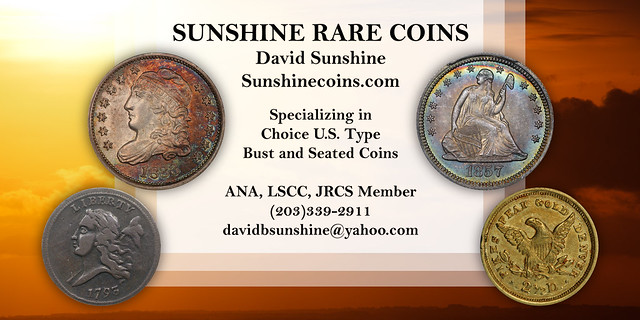
MORE ON THE NAPOLEON MYSTERY MEDALLION
Pete Smith submitted these new thoughts on the previously-discussed mystery medallion. Thanks! -Editor
The July 4, 2021, issue of The E-Sylum had a mystery medal with a rider on a horse. Chip
Howell saw a similarity to the painting of Washington Crossing the Alps.
I thought the
differences were significant.
MORE ON JEAN COHEN'S LINCOLN CENT BOOK
Regarding Jean Cohen's Lincoln Cent variety book, Mark Lighterman submitted these notes on the book's acquisition by The Combined Organizations of Numismatic Error Collectors of America (CONECA). Thank you. -Editor
I first had the pleasure of meeting Jean Cohen in early 2013. Jean contacted me as president of CONECA to work out the details of donating her book ‘The Classification and Value of Errors on the Lincoln Cent' to CONECA.
Jean's original email to me stated the following:
"Forty-three years ago I published "The Classification and Value of Errors on the Lincoln Cent", 600 pages, 6000 illustrations. Life took me down another path shortly thereafter. Now I am 82 years old with macular degeneration. The time has come for me to get all this material into the hands of those that will appreciate it."
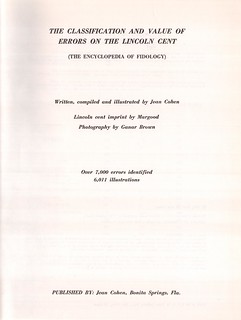 Both sides wanted to meet so we could work out the details of the
donation. Jean, Gary Lewis, her husband Don, my mother and myself meet
at her home in Bonita Springs and as we began to talk about errors and
our love for the hobby and CONECA she realized the donation would in
fact be in good hands and by the end of the meeting she had donated all
copyrights to the book, her compete collection of Lincoln cents that
were the reference coins to those listed in the book and an additional
$500.
Both sides wanted to meet so we could work out the details of the
donation. Jean, Gary Lewis, her husband Don, my mother and myself meet
at her home in Bonita Springs and as we began to talk about errors and
our love for the hobby and CONECA she realized the donation would in
fact be in good hands and by the end of the meeting she had donated all
copyrights to the book, her compete collection of Lincoln cents that
were the reference coins to those listed in the book and an additional
$500.
As the steward of the collection for CONECA, very few have had any access to the coins because of the cataloging method she used in storing the collection and even after all these years working out whom and how to proceed with any changes the collection is still intact as it originally donated. Below is a photo that I took of Jean, Don and Gary Lewis at the end of that meeting. (Gary Lewis left, Don Cohen center, Jean Cohen right)
CONECA also has been discussing details of how to re-publish the book for our members. Out of all the materials she donated was the original paste-up and one unbound copy of the book. She did not even retain a bound copy for herself.
We did keep in touch occasionally throughout the years until her passing. On a side note and what I still feel sealed the deal that day was during our meeting (Jean, Gary and myself), Myrna and Don went out onto the porch of their home that overlooks the Gulf to talk and connect. It was a surprise for them to interrupt our meeting to find out that my mother worked alongside Don's brother at the University of Miami Medical school some fifty years earlier. Our hobby is a very small community.
To read the earlier E-Sylum article, see:
JEAN COHEN'S LINCOLN CENT BOOK
(https://www.coinbooks.org/v24/esylum_v24n45a12.html)
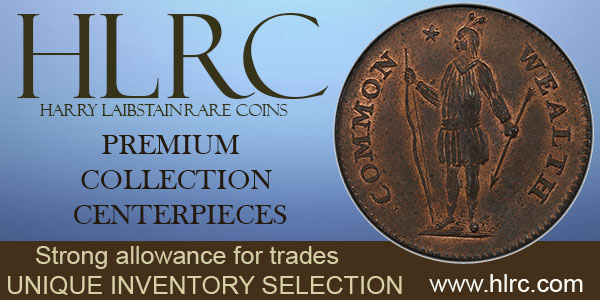
MORE ON THE TRAVEL CAR COIN MUSEUM
Dave Lange writes:
"I liked the postcard with its traveling museum. The date range for this vehicle (and the card) may be narrowed down considerably from the 1900-20 provided. The former is an example of the ubiquitous Ford Model T. It has a nickel-plated radiator rather than the earlier brass variety, so the truck is a 1916 model or later. The font used in the card's title was in vogue from roughly 1910-25. Given that the vehicle had already logged over 100 thousand miles, I suggest that the postcard probably dates to the period 1918-25."
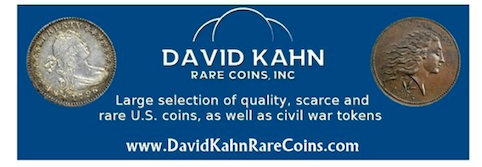
NOTES FROM E-SYLUM READERS: NOVEMBER 14, 2021
Numismatics Knows No Borders
Regarding last week's addition of a subscriber from Inner Mongolia,
Andy Newman writes:
"Wow, impressive diversity, Wayne."
Indeed. While we've had international subscribers since our very early issues, it's amazing to see our wide and growing reach. Numismatics knows no borders! -Editor
Other topics this week include the Dealer's Numismatic Association, ancient coin cartoons, and more Library Jokes. -Editor

QUERY: GLOBAL CERTIFICATION SERVICES
British tabloid The Sun has recently taken to republishing eBay sale results as articles with clickbait headlines - "Rare Lincoln Penny Sells for $thousands - do you have one?" It's not a bad way to get attention online, and probably something actual numismatic organizations should consider doing, only with better facts and links to appropriate related websites, as a way to reach out to potential collectors.
Anyway, one of these articles caught my eye this week because of the holders the coins were in: "Global Certification Services". I don't believe we've discussed this company before - is anyone familiar with them? A search on the Newman Portal turned up hits on Coin World circa 2002 and in both CW and The Numismatist circa 2006-2007. From the snippet text these seem to be paid ads. Len Augsburger of NNP supplied an image of an ad from the Coin World issue of 8/12/2002.
The holders include some informative text and images. The eBay lot discussed was a group of 13 circulated Carson City dollars in GCS holders. There are no grades listed. -Editor

MEDIALIA GALLERY IS MOVING
Medialia Gallery is moving from its longtime New York location. Mashiko forwarded this announcement flyer. Open by appointment through the end of this month, the art medal gallery plans to reopen across the river in Jersey City Heights in 2022. Stay tuned for more details. -Editor
VOCABULARY TERM: GALVANISM
Here's another entry from Dick Johnson's Encyclopedia of Coin and Medal Terminology. I added an image of a Boyds Battery. -Editor
Galvanism. The branch of physical science dealing with electrical currents. It is named after Luigi (or Aloisio) Galvani (1737-1798), an Italian who is credited with its first observation (1791). Shortly after Galvani's discovery it was another Italian, Alessandro Volta (1745-1827) who developed the voltaic pile (1800) that lead to the primitive battery which supplied the current necessary for electrolysis.
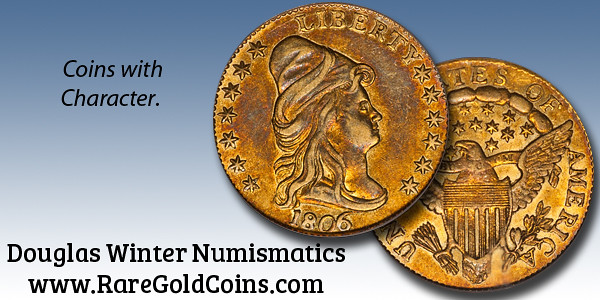
BOYDS BATTERY
While searching for an image of the Boyd's Battery medal for the Vocabulary article in this issue, I came across this Wordcraft page on Magnetic Healing Batteries. -Editor
The most famous of the medical batteries was the Boyds Battery. They are fairly easy to find and they polish up nicely. They were made with different metals that promised to create a healing electrical current when pressed against your skin. The galvanic properties were released by the different metals reacting to the moisture in your skin. Some people claimed that they tingled as they worked to draw out the bad energies from your body and replace them with good energy.
NUMISMATIC SOCIETY OF PHILADELPHIA OFFICERS
American Numismatic Biographies author Pete Smith submitted this article on Honorary Vice Presidents of the Numismatic and Antiquarian Society of Philadelphia. Thanks. -Editor
The Numismatic Society of Philadelphia was formed on January 1, 1858, as the first coin club in the United States. Joseph A. Mickley served as first president. In 1865, the name was changed to the Numismatic and Antiquarian Society of Philadelphia. The Society was reported to remain active as recently as 2012.
WHITMAN PUBLISHING SEEKS ASSOCIATE EDITOR
A lot of people are quitting their jobs these days and considering new careers. Why not follow your passion into numismatics and collectibles? Last week we noted that Stack's Bowers was hiring; this week it's Whitman Publishing. -Editor
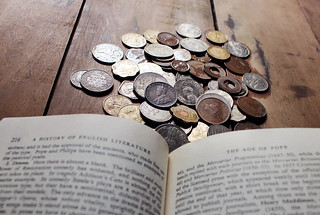 Whitman Publishing seeks to hire an editor to work on books in the antiques-and-collectibles and American history fields. The position is full-time and on-site in the company's Pelham, Alabama, office (just outside Birmingham).
Whitman Publishing seeks to hire an editor to work on books in the antiques-and-collectibles and American history fields. The position is full-time and on-site in the company's Pelham, Alabama, office (just outside Birmingham).
A degree in a subject related to publishing (e.g., English, communications, writing) is required; and a strong background in technical writing, scientific writing, or cataloging will be useful.
For the main project involved in this position, the associate editor will fulfill all editorial duties, from macro to micro: project management (including managing processes, files, and people [freelance writers, subject-matter experts, and others]), writing, copyediting, photo research, editing spreadsheets and converting data to composition-ready Word files, and proofreading laid-out pages.
COLONIAL COIN COLLECTORS CLUB 2021 AUCTION
It's that time of year again - the Colonial Coin Collectors Club auction. Here's a blog article from Stack's Bowers. -Editor
Stack's Bowers Galleries is pleased to once again present a dedicated colonial and early American coins session in our November 2021 Showcase Auction. This year marks the 10th year we have presented this official auction of the Colonial Coin Collectors Club (C4), held in conjunction with the C4 National Convention. This year's sale features an exciting array of colonial and pre-federal coins, including long off the market collections, significant new discoveries, and well pedigreed rarities across a variety of series. The offerings span from Massachusetts silver to desirable state coppers and early Washington pieces, with many exciting items in between.
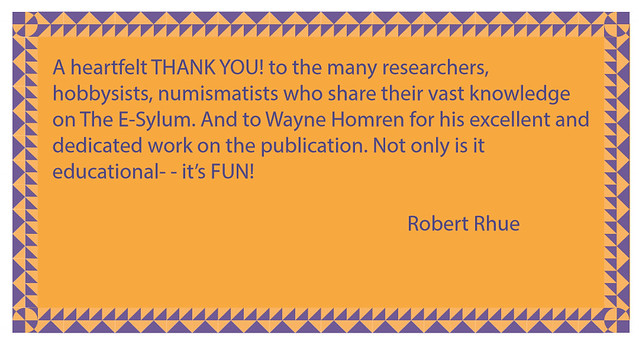
2013 SILVER LEALANA 0.1 BITCOIN OFFERED
Last month we discussed the "Gold Cas", the one-ounce gold coin with a denomination of 1,000 Bitcoins. This Stack's Bowers press release discusses the much smaller denomination Silver Lealana 0.1 Bitcoin. -Editor
Stack's Bowers Galleries is excited to present a physical Lealana Bitcoin in lot 4151 of their November 2021 Showcase Auction. Graded SP-70 by PCGS, it is the very first bitcoin from the Lealana series to be certified by that service and will also be the very first piece of physical cryptocurrency offered in a major live auction. It features an intrinsic face value, or peel value,
of 0.1 Bitcoin (BTC), equivalent to roughly USD$6,500 at the time of publishing. With a current high-bid of $7,000 and two more weeks remaining before it crosses the auction block in Costa Mesa, California, enthusiasm among aficionados of cryptocurrency and traditional numismatists is strong for this new and exciting numismatic category.
DAVISSONS E-AUCTION 42
Allan Davisson wrote this overview of his firm's upcoming E-Auction. I added some lot images for illustration. -Editor
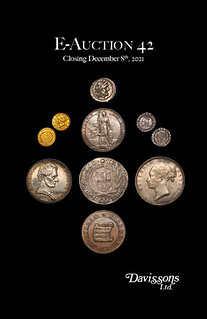 E-Auction 42, closing Wednesday, December 8th 2021, is online now! Print copies were sent over the weekend, if you are not on our mailing list and would like a copy please let us know.
E-Auction 42, closing Wednesday, December 8th 2021, is online now! Print copies were sent over the weekend, if you are not on our mailing list and would like a copy please let us know.
‘Twas a dark and stormy time….
We received an unusual consignment for this sale—a group of United States coins minted in 1853. All the gold issues (the first $3 gold piece was issued in 1854), and a choice large cent. I became fascinated by what must have been happening in this year that usually has no particular historic resonance.
The year 1853 was a time of tension and uncertainty. It was an era where things were happening in the United States—the Gadsden Purchase of land from Mexico that expanded the southern parts of modern day Arizona and New Mexico, the arrival of Commodore Perry in Japan seeking trade and consequently opening
Japan to the West, the Crimean War that resulted in the defeat of the Russian Empire and Florence Nightingale's introduction of modern nursing practices. On a more mundane level, Levi Strauss and Otis Elevator began business along with the predecessor firm for Traveler's Insurance.
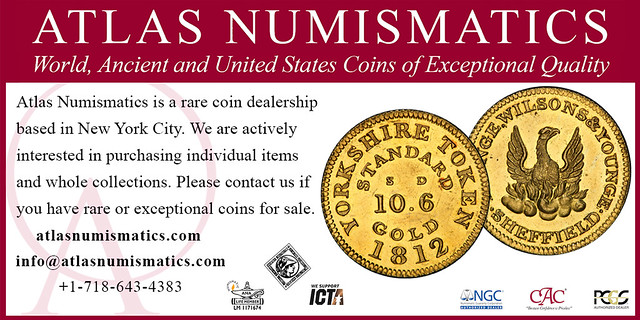
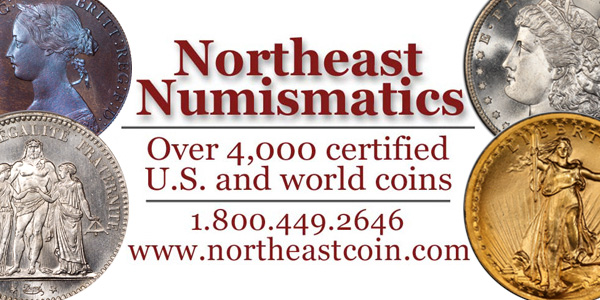
NUMISMATIC NUGGETS: NOVEMBER 14, 2021
Here's a selection of interesting or unusual items I came across in the marketplace this week. Tell us what you think of some of these. -Editor
Bruttium, Kaulonia. Silver Stater, c. 530-510 BC. Obverse: ??V??, archaic Apollo standing right, small running figure on outstretched left arm. Reverse: Incuse of obverse. Very Fine. (SNG 153/155). 7.33g.
From the Baldwin's site. -Editor
To read the complete lot description, see:
BRUTTIUM, KAULONIA, SILVER STATER
(https://www.baldwin.co.uk/product/bruttium-kaulonia-silver-stater/)
Other topics this week include a George III Guinea, a "Comitia Americana" tray, and the astronaut José Jiménez Silver Robbins Medallion. -Editor

CANADA'S OLDEST ENGLISH COIN?
An unremarkable coin found in a remarkable place: uncovered in Newfoundland, this Henry VII half groat could be the oldest English coin found in Canada. -Editor
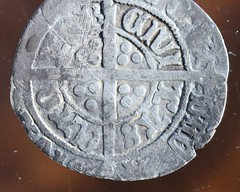 An archeological fieldworker excavating a site in eastern Newfoundland has unearthed what could be the oldest English coin ever found in Canada.
An archeological fieldworker excavating a site in eastern Newfoundland has unearthed what could be the oldest English coin ever found in Canada.
William Gilbert, head archeologist and supervisor at the Cupids Cove Plantation Provincial Historic Site, says one of his colleagues found the silver coin in September, adding that research has confirmed it was minted sometime between 1493 and 1499.
It's important because it sparks your imagination,
Gilbert said in an interview Wednesday. The coin, he added, is more than a century older than Cupids, founded in 1610. You just have to wonder when you look at this thing: how many hands did it pass through?

COMMEMORATIVE COIN TAB TONING
A nice CoinWeek article by Dan Duncan discusses the distinctive toning seen on examples of classic U.S. commemorative coins due to their storage in the original cardboard shipping holders. Here's a short excerpt - see the complete article online. Great photos! -Editor
Coins are toned when the silver oxidizes after coming into contact with foreign material and gases. The toning patterns and colors are determined by how the coins were stored, either as originally distributed or in their collected environments. Morgan dollars are known to have a textile tone from the canvas bag, and many examples display end roll toning from the folded ends of the paper wraps in which they were stored. Roosevelt and Mercury dimes can be found with a banded toning from the bank cards that encouraged account holders to save in the fifties and sixties. Of course, all silver coins can be found with target toning featuring colorful bands extending from the peripheries from years of sitting in various collector albums.
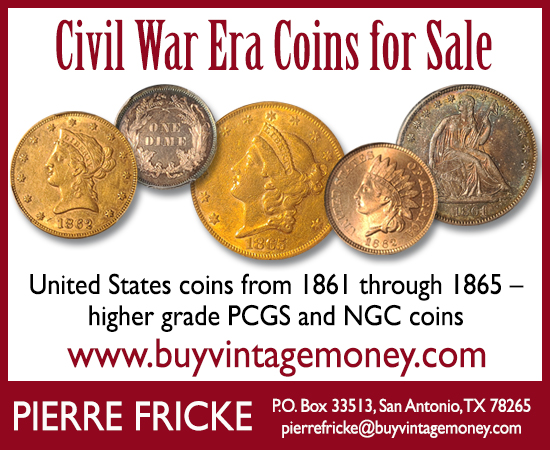
THANKSGIVING VIGNETTES
In the U.S., the Thanksgiving holiday will soon be upon us. John Ferreri kindly submitted this timely article about Thanksgiving vignettes on obsolete paper money. -Editor
An Historic American Event
C. John Ferreri
THE BOOK BAZARRE
PANDEMIC EFFECTS ON BRICK-AND-MORTAR SELLERS
Worthpoint's Worthopedia is a great service for pricing data for collectibles, including coins. Worthpoint also publishes interesting newsletter articles on various collectibles. A November 8th piece by Jack Rose about the effects of the pandemic on brick-and-mortar antique sellers probably rings true in the numismatic world as well. Here's an excerpt - see the complete article online. -Editor
The effects of COVID-19 on the U.S. economy are far-reaching. Jobs were lost, businesses went under, entire industries were shaken to their cores.
One of the most pronounced effects of COVID-19 has been the push to move processes to the digital space. As a result, people are working from home, online shopping has skyrocketed, and physical retail spaces have been hurting.
So just what have been the effects of COVID-19 on brick and mortar antiques retailers? Well, it's a mixed bag of the good, the bad, and the ugly.
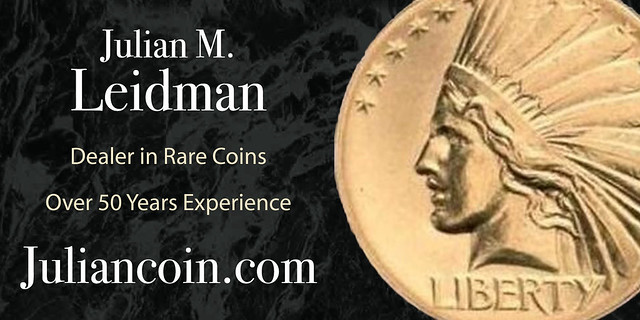
VENEZUELAN ARTIST PAINTS OLD BANKNOTES
Artists and craftsmen often repurpose obsolete banknotes, especially in nations hard-hit with hyperinflation. Here's a new story about an artist in Venezuela making use of the country's worthless banknotes. -Editor
Venezuelan artist and medical student Elianni Di Gregorio is using old bolivar notes as canvas for her paintings as she strives to give them new value after rampant hyper inflation and successive overhauls saw them discarded.
Di Gregorio, 24, decided to paint on bolivar notes thrown away in the trash to restore some of the currency's former glory.

GIZMO'S PAINTING ACCEPTS DOGECOIN!
On Facebook John Kraljevich writes:
"Someday, there will be invisible secret money that only exists as bits of computer code.
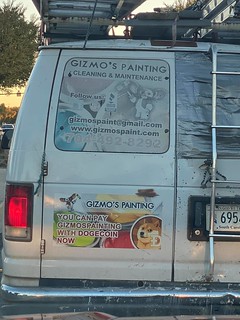 "People will make fun of that weird invisible money by creating their own invisible money that's named after a famous funny Internet dog.
"People will make fun of that weird invisible money by creating their own invisible money that's named after a famous funny Internet dog.
"Anyway, you'll be able to hire a painter with that."
This year my son gave me cryptocurrency for my birthday. Mind you, for grins I already have some in my PayPal account (Bitcoin and Ethereum), but I had to set up CoinBase to accept his gift of Cardano ADA coins. Does Gizmo accept those for small jobs up in Virginia?
These are the Wild West days of electronic money, like the wildcat banking era before the National Bank Act. Everybody has their own crypto money, with varying methods to store and spend it, and limited choices on who will accept it. Someday there will become a consensus and standard, but buckle up folks - it's going to be a bumpy ride. -Editor
To see the Facebook post, see:
https://www.facebook.com/photo.php?fbid=10227998307962843
And right on cue, here's an article about the Mastercard crypto card. -Editor
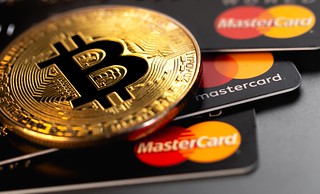 Mastercard partnered with cryptocurrency finserv platforms Amber Group, Bitkub, and CoinJar to launch crypto payment cards in Asia-Pacific, per a press release. The cards will convert digital tokens into fiat currency that can be used anywhere Mastercard is accepted. The initiative is part of Mastercard's global crypto card program, which seeks to support native digital currencies as payment tools.
Mastercard partnered with cryptocurrency finserv platforms Amber Group, Bitkub, and CoinJar to launch crypto payment cards in Asia-Pacific, per a press release. The cards will convert digital tokens into fiat currency that can be used anywhere Mastercard is accepted. The initiative is part of Mastercard's global crypto card program, which seeks to support native digital currencies as payment tools.
Major financial institutions—like JPMorgan, Wells Fargo, and Capital One—increased crypto talent hiring by 40% in the first half of 2021 compared with the same period last year, per LinkedIn data. Facilitating crypto payments may therefore be an attempt to keep issuers tied to Mastercard's network as they start thinking about offering crypto services.
To read the complete article, see:
Mastercard will launch crypto cards in Asia amid heightened local demand for digital currencies
(https://www.emarketer.com/content/mastercard-will-launch-crypto-cards-asia-amid-heightened-local-demand-digital-currencies)
Mastercard launches credit card with cashback in cryptocurrencies
(https://olhardigital.com.br/en/2021/04/27/pro/mastercard-lanca-cartao-com-cashback-em-criptomoedas/)
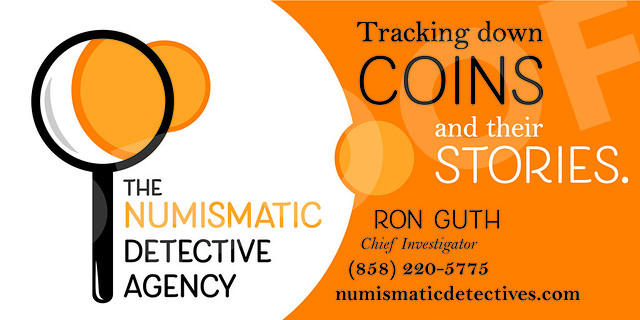
LOOSE CHANGE: NOVEMBER 14, 2021
Here are some additional items in the media this week that may be of interest. -Editor
The latest Mike Markowitz article in his CoinWeek Ancient Coin Series is on "The Archaic Smile on Ancient Coins". -Editor
ANCIENT GREEK COINS struck before 500 BCE are called archaic
by numismatists. Actually, archaic features continue to appear on coins for at least another century or so. Male and female faces on many of these coins bear a faint, enigmatic smile, something that is also found in sculpture and vase painting from this era. For centuries, art historians have been fascinated by this Archaic Smile
, and many different theories have been proposed to explain it.
An early example is found on a 2.57 gram electrum hekte (one-sixth stater) of Phokaia (or Phocaea), a coastal town in Ionia (on the eastern shore of the Aegean Sea). Dated to c. 521-478 BCE, the coin bears a female head wearing a helmet or close-fitting cap.
The only female figure in ancient art usually depicted wearing a helmet is Athena, in her aspect as a war goddess. On the coin, her full lips are slightly upturned, and although the head is shown in profile, the large almond-shaped eye appears as if viewed frontally. This is a standard feature of archaic portraiture.
To read the complete article, see:
The Archaic Smile on Ancient Coins
(https://coinweek.com/ancient-coins/the-archaic-smile-on-ancient-coins/)
Other topics this week include the Semiquincentennial Commemorative Coin Act, and Powell's Books. -Editor

GRANDILOQUENT WORDS OF THE 19TH CENTURY
We love words here at The E-Sylum. Check out this New York Times article on the fanciful grandiloquent words of the 19th century. -Editor
Have you ever been inveigled? Bamboozled? Have you been hornswoggled by lexiphanic rodomontade? Have you fallen victim to the flummery of an ultracrepidarian?
